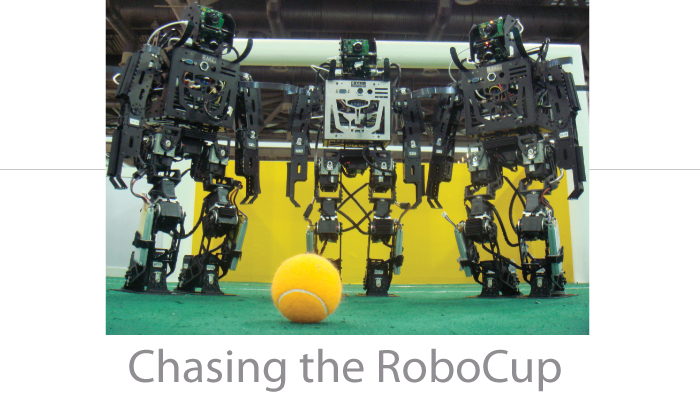|
A group of current and former Virginia Tech students fielded a team in a prestigious international robotics competition in China this summer, the lone U.S.-based entry in the humanoid division of RoboCup 2008, a contest in which experts from around the world pitted autonomous soccer playing robots against each other.
While Team VT DARwIn was unable to match the U.S. Women's Olympic soccer team's success in winning a gold medal at another recent high-profile competition in China, its members returned eager to continue their research in robotics and looking forward to next year's contest.
"It was really inspiring, to be honest," says team leader Jesse Hurdus (M.S. mechanical engineering '08), who now works at TORC Technologies, an autonomous systems company located in the Virginia Tech Corporate Research Center.
Team VT DARwIn--an acronym for Dynamic Anthropomorphic Robot with Intelligence--became the first team from the United States to participate in RoboCup's humanoid league when it qualified for the 2007 competition in Atlanta. This year, the team was able to travel much farther to compete, thanks largely to sponsors, including Altria, SAIC, National Instruments, and Pat Artis (engineering mechanics '72). TORC Technologies, which was founded by Virginia Tech alumni, provided technical support.
"Corporate support is helping us a lot," Team VT DARwIn faculty advisor Dennis Hong said shortly before leaving for the contest, which ran from July 14 to 20 in Suzhou, China. "This is an expensive competition."
RoboCup is one of several high-profile scientific contests intended to speed technological advances in robotics and artificial intelligence. Other examples include a competition to develop a car capable of getting 100 miles to the gallon and the U.S. Department of Defense-sponsored races for vehicles programmed to drive themselves. A Virginia Tech team placed third in last year's DARPA Urban Challenge autonomous vehicle race; Hong and Hurdus were both on that team as well.
First held in 1997, RoboCup's official goal is for a team of robots to be able to defeat a world champion team of human soccer players by the year 2050, yet the competition also is intended to spark developments that will make robots more useful to humans, such as helping in rescue operations or assisting the disabled or elderly, among other applications.
| For more information on how corporations and foundations are helping to advance research at Virginia Tech, visit the new website of our Office of Corporate and Foundation Relations at www.cfr.givingto.vt.edu. |
|
"It's not just fun and games," Hong says. "It's really for forwarding research in robotics. People present research papers and give technical talks on the development of their autonomous robots."
RoboCup team members are allowed to program their robots to perform specific functions on the field, such as forward, defender, and goalie, but the robots have to play autonomously--not controlled remotely by their handlers--for two 15-minute periods.
The roots of Team VT DARwIn go back to 2004, when Hong and his students created a two-legged humanoid robot as part of their research into bipedal locomotion. Since then, he and his students have created progressively more advanced versions. For RoboCup 2008, they fielded the DARwIn III series. Each of the three robots they took to China cost about $18,000, operate on advanced software, and are packed with sensors and motors.
Hong, who was also faculty advisor to the university's 2007 RoboCup team, says this year's contest seemed to have more energy than last year's.
"In Atlanta, the competition was divided up into many different venues because it didn't fit in one. In China, it was in this one humongous, state-of-the-art expo center. All the different teams, with thousands of people, were packed in one site. The excitement and energy at the venue were unbelievable."
Hurdus, who also participated in the 2007 contest, says, "In the Far East, there is a public fascination with robots that is just bigger than it is in the United States. We definitely felt that and saw that as well. There were big billboards advertising the contest. At the competition itself, there were huge crowds of not just roboticists but families and children who came to see robots play soccer on the entertainment side, not just the research side."
Human World Cup soccer contests use the term "the group of death" to refer to a scenario when several good teams are bracketed to play each other in early rounds, making it tougher for any of them to advance in the tournament. Team VT DARwIn had the misfortune to be in RoboCup's equivalent, facing two powerhouses, Team Osaka and CIT-Brains, early in the competition and getting shut out by both. In its third match, Team VT DARwIn played the University of Manitoba to a scoreless tie in the longest game in RoboCup history. After multiple overtimes and rounds of penalty kicks, "we lost literally by a coin toss," says Hong.
This year, as in 2007, Team VT DARwIn competed in RoboCup's kid-size division for humanoid robots between 30 centimeters and 60 centimeters in height. Next year, Hong plans to field a "redeem team" in the teen-size division for robots between 80 centimeters and 130 centimeters tall. Students are already hard at work developing these robots for RoboCup 2009.
|



